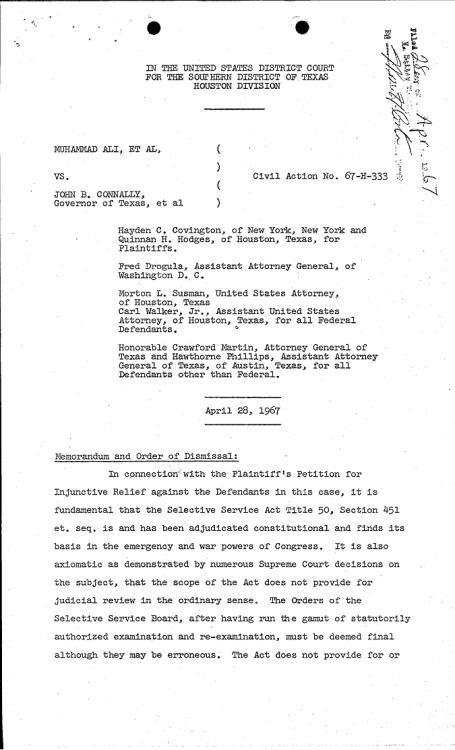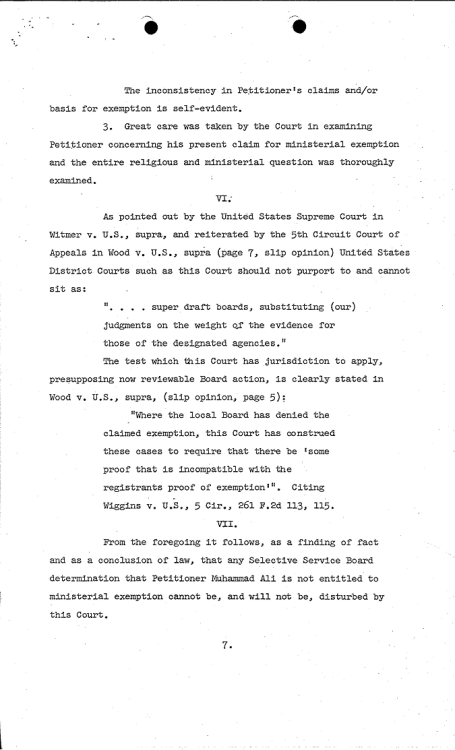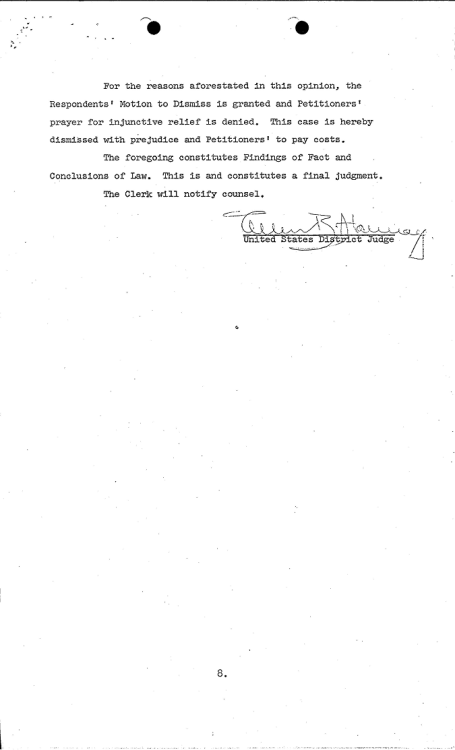In U.S. District Court, a judge found that “ … any Selective Service Board determin
In U.S. District Court, a judge found that “ … any Selective Service Board determination that Petitioner Muhammad Ali is not entitled to ministerial exemption cannot be, and will not be, disturbed by this Court.” [p.1,7,8] 4/28/1967.Series: Civil Case Files, 1938 - 1997Record Group 21: Records of District Courts of the United States, 1685 - 2009Transcription: Filed 28th of April, 1967 (illegible) By (illegible), DeputyIN THE UNITED STATES DISTRICT COURT FOR THE SOUTHERN DISTRICT OF TEXAS HOUSTON DIVISIONMUHAMMED ALI, ET AL, VS. JOHN B CONNOLLY, Governor of Texas, et al Civil Action No. 67-H-333Hayden C. Covington, of New York, New York and Quinnan H. Hodges, of Houston, Texas for Plaintiffs.Fred Drogula, Assistant Attorney General, of Washington, D.C.Martin L. Susman, United States Attorney of Houston, TexasCarl Walker, Jr. Assistant United States Attorney of Houston, Texas, for all Federal DefendantsHonorable Crawford Martin, Attorney General of Texas and Hawthorne Phillips, Assistant Attorney General of Texas, of Austin, Texas, for all Defendants other than Federal. ________________ April 28, 1967 _________________Memorandum and order of Dismissal (underscore) In connection with the Plaintiff’s Petition for Injunctive Relief against the defendants in this case, it is fundamental that the Selective Service Act Title 50, Section 451 et. seq. is and hasbeen adjudicated constitutional and finds its basis in the emergency and war powers of Congress. It is also axiomatic as demonstrated by numerous Supreme Court decisions on the subject, thatthe scope of the Act does not provide for judicial review in the ordinary sense. The Orders of the Selective Service Board, after having run the gamut of statutorily authorized examination and re-examination, must be deemed final although they may be erroneous. The Act does not provide for or[page 2]The inconsistency in Petitioner’s claims and/or basis for exemption is self-evident. 3. Great care was taken by the Court in examining Petitioner concerning his present claim for ministerial exemption and the entire religious and ministerial question was thoroughly examined. VI. As pointed out by the United States Supreme Court in Witmer v. U.S., supra, and reiterated by the 5th Circuit Court of Appeals in Wood v. U.S. , supra (page 7, slip opinion) United States District Courts such as this Court should not purport to and cannot sit as: “… . super draft boards, substituting (our) judgments on the weight of the evidence for those of the designated agencies.” The test which this Court has jurisdiction to apply, presupposing now reviewable Board action, is clearly stated in Wood v. U.S., supra, (slip opinion, page 5): “Where the local Board has denied the claimed exemption, this Court has construed these cases to require that there be ‘some proof that is incompatible with the registrants proof of exemption’”. Citing Wiggins v. U.S., 5 Cir., 261 F.2d 113, 115. VII. From the foregoing it follows, as a finding of fact and as a conclusion of law, that any Selective Service Board determination that Petitioner Muhammad Alis is not entitled to ministerial exemption cannot be, and will not be, disturbed by this Court. 7.[page 3]For the reasons aforestated in this opinion, the Respondents' Motion to Dismiss is granted and Petitioners’ prayer for injunctive relief is denied. This case is hereby dismissed with prejudice and Petitioners’ to pay costs. The foregoing constitutes Findings of Fact and Conclusions of Law. This is and constitutes a final judgment. The Clerk will notify counsel. (Signature) Allen B. Hannay United States District Judge -- source link
Tumblr Blog : todaysdocument.tumblr.com
#archivesgov#april 28#muhammad ali#district court#the draft#conscription#vietnam war


